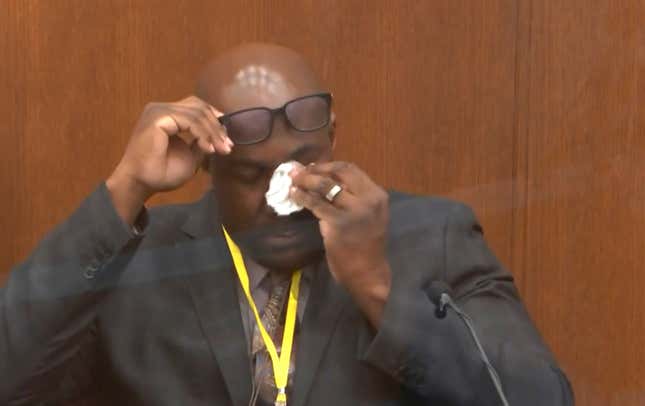
Day 11 of Derek Chauvin’s trial saw a cardiologist push back against the idea a heart attack caused George Floyd’s death; George Floyd’s brother gave a moving “spark-of-life” testimony, and another use of force expert explained how the force used on Floyd was not within reason.
The police shooting of 20-year-old Daunte Wright in nearby Brooklyn Center on Sunday cast yet another shadow over the proceedings. According to the New York Times, Defense attorney Eric Nelson requested that the jurors be sequestered, as any potential unrest in the city could have the undue effect of making the jurors feel like they can’t cast a “not guilty” verdict for fear of causing more unrest. Judge Peter Cahill declined the request, saying “This is a totally different case.”
The first person to take the stand this morning was Dr. Jonathan Rich, a cardiologist. The defense has heavily focused on Floyd’s pre-existing conditions; arguing that a blockage in his arteries as well as him suffering from hypertension were the primary factors that contributed to Floyd’s death.
Rich, like many of the medical experts the prosecution has called, pushed back against that assertion. He reviewed Floyd’s medical records and found that there was no reason to assume anything but the actions of law enforcement caused George Floyd’s death. When asked by the prosecution if he saw any signs that Floyd had a heart attack, Rich replied “None, whatsoever.”
From New York Times:
After reviewing a toxicology report, he said that Mr. Floyd’s methamphetamine levels were low, and that he did not see any signs that a drug overdose had caused his death.
And after watching the video of Mr. Floyd’s arrest, Dr. Rich said he determined that Mr. Floyd was restrained in a life-threatening manner, and that there was no evidence of a sudden cardiac death.
He said he believed Mr. Floyd would have lived, had he been given treatment during several instances shown on the video.
He said he noticed that an officer had said at some point during the arrest that he believed Mr. Floyd was passing out. “That would have been an opportunity to quickly relieve him from that position of not getting enough oxygen,” Dr. Rich said.
He also noted that one officer had suggested that Mr. Floyd be turned on his side but was told to “leave him.” When officers learned that Mr. Floyd had no pulse, their immediate response should have been to administer chest compressions, he said.
Rich ultimately concluded that he found Floyd’s death to be “absolutely preventable.”
Following Rich, was testimony from Philonise Floyd—Floyd’s brother. According to CNN, Floyd’s testimony was focused on the kind of man his brother was. Floyd testified that his anniversary is on May 24, his brother died on May 25, and his mother died on May 29, making the month of May bittersweet for him now.
He spoke about how George Floyd was a “mama’s boy,” and tried his best to set an example for his siblings. “Being around him, he showed us, like, how to treat our mom, and how to respect our mom. He just — he loved her so dearly.” Floyd also added how hard their mother’s death was for his brother.
The defense opted not to cross examine Floyd and Seth Stoughton was the final person who took the stand for the day. Stoughton was a former officer, and currently works as a law professor and use of force expert. Earlier in the day, the defense filed a motion to block Stoughton’s testimony on the grounds that it would be redundant considering how many use-of-force experts who had already testified.
The main takeaway from Stoughton’s testimony was that at every step of the way, Chauvin didn’t behave like a reasonable police officer. “Mr. Floyd does not appear to have the intention to assault or attack the officers,” he said. “No reasonable officer would have believed that that was an appropriate, acceptable or reasonable use of force.”
One key element of the defense’s argument Stoughton pushed back on was the idea that the crowd was both a threat and a contributing factor as to why the situation ended with Floyd’s death. Stoughton pointed out that the crowd didn’t begin to berate the officers until over three minutes into the confrontation. He added that if the officers perceived the crowd as a threat, they wouldn’t have made provocative statements like “This is why you don’t do drugs.”
We are nearing the end of the trial, as the judge told the jury to expect this week to possibly end early, with closing arguments being heard next Monday. The rest of the week will involve the defense laying out their case, and I’m not really looking forward to hearing them argue how it was George Floyd’s fault, actually.

